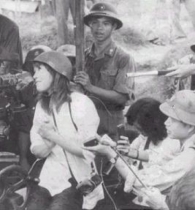
Jane Fonda is seen on an anti-aircraft gun in Hanoi.
Photo: Wikipedia
When Americans of a certain vintage think of “the Vietnam era,” one image that comes to mind – famous to some, infamous to others – is of actress Jane Fonda posing at the trigger of an anti-aircraft gun in Hanoi. The nickname “Hanoi Jane” will get a prominent mention in her obituary.
Fonda was the most famous of several American anti-war activists who managed to visit North Vietnam to bear witness to a war that seemed a greater mismatch than David and Goliath. Largely forgotten are the anti-war stories of other Yankee peaceniks who traveled to Vietnam in a flanking maneuver to win the hearts and minds of both Vietnamese and Americans. To critics, they were feckless pinko collaborators at best; to others, soldiers of conscience, fighting the good fight.
Last Friday and Saturday, several of these anti-war veterans made a proud pilgrimage to Hanoi to attend events commemorating the 40th anniversary of the Paris accords that led to the withdrawal of U.S. troops. They were an eclectic bunch. Among them were “yippies” like Nancy Kushner and Judy Gumbo Albert, former U.S. Attorney General Ramsey Clark, “Chicago Seven” defendant Rennie Davis and Catholic Bishop Thomas Gumbleton of Detroit. Also present were pacifists Doug Hostetter, a conscientious objector who did social work in Vietnam during the war, and John McAuliff, the founder of the Fund for Reconciliation and Development and formerly with the American Friends Service Committee.
Waging peace can be an exciting, romantic, dangerous endeavor. What did the anti-warriors do? Some of them partied hard. An older newspaper colleague once told a few of us, younger reporters, how we had missed out – that protests were the best place to meet women in the age of free love. For others, the quest for social justice is a calling.
Nancy Kushner, at 67, recalls some of it with whimsy: “We used to say a yippie was a hippie who got hit on the head with a police club and got politicized.”
It was after the famous, massive protest at the Pentagon in October 1967, she said, that she and her then-boyfriend, Jerry Rubin, joined a gathering at Abbie Hoffman’s place in New York City. Hoffman and Rubin were becoming icons of America’s counter-culture.
In a mood augmented by marijuana, the nickname “yippies” was conceived as a funny nickname for what they called the Youth International Party, which was less an earnest political organization than perpetual happening. Then they started to organize a festival of peace, love, weed and music as a counterpoint to the Democratic Party Convention in August 1968 . . . a festival that, as things turned out, would devolve into violent mayhem. The Chicago police were widely blamed, but Rubin, Hoffman joined Davis and five others who would be put on trial for conspiracy and inciting a riot.
The war would drag on for more than four more years, with body count rising on all sides. As the war escalated, so did the protests. Frank Joyce, who also attended the Hanoi ceremony, remembers how he and a friend were in a village south of Hanoi in May 1970 when their Vietnamese hosts told them some shocking news: That four anti-war protestors had been shot dead at Kent State University by America’s own National Guard troops.
“One of our slogans had been, ‘Bring the war home,’” Joyce said. “Those deaths brought the war home in a way that people couldn’t ignore it any more.”
At the gathering, I didn’t just want to talk about the past. In a brief chat with Clark, now 85 years old, he mentioned that he had served as legal counsel to young John Kerry when, as the leader of Vietnam Veterans Against the War, he joined other veterans in throwing away their combat medals during a demonstration in Washington DC.
Now President Obama, who was just 11 years old when the Paris agreement was signed, wants Kerry to be his Secretary of State and another Vietnam combat veteran who has been critical of military force, Chuck Hagel, to be Secretary of Defense. Clark said he is hopeful that Kerry and Hagel “will bring a different vision of war” than some of their hawkish predecessors.
Scott Harris
Source: tuoitrenews.vn






